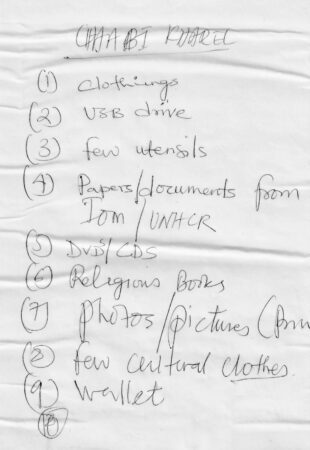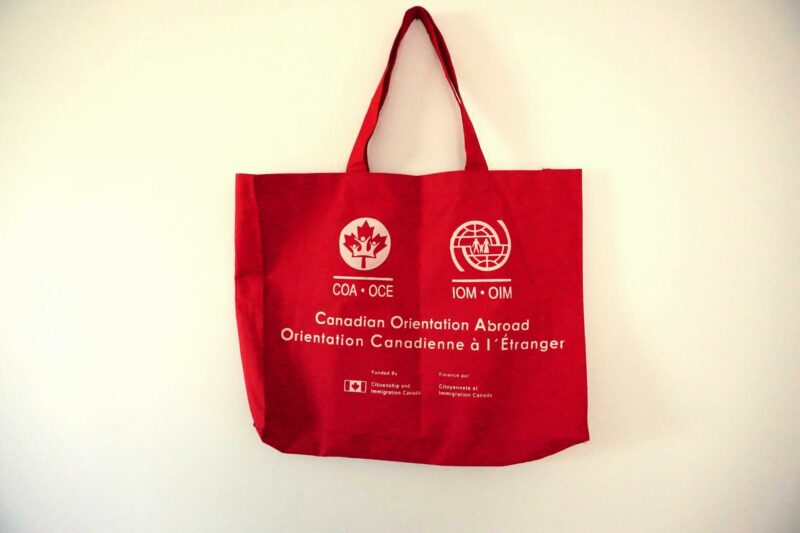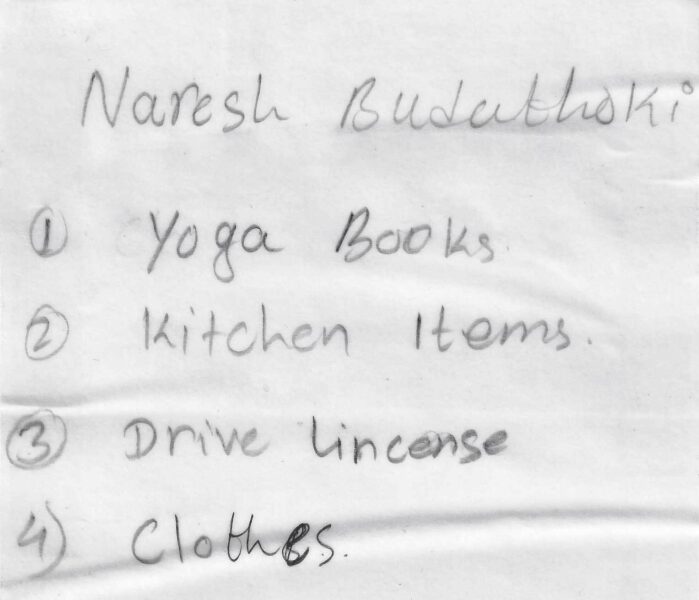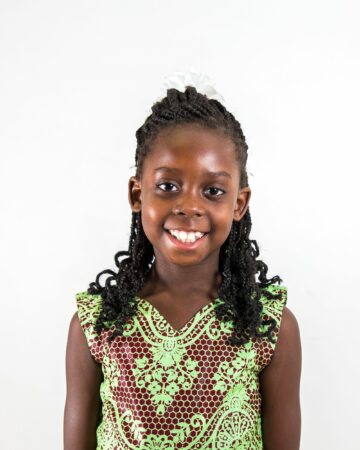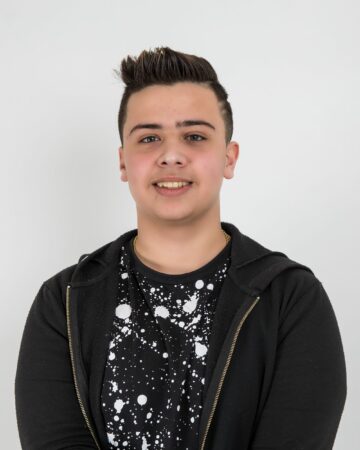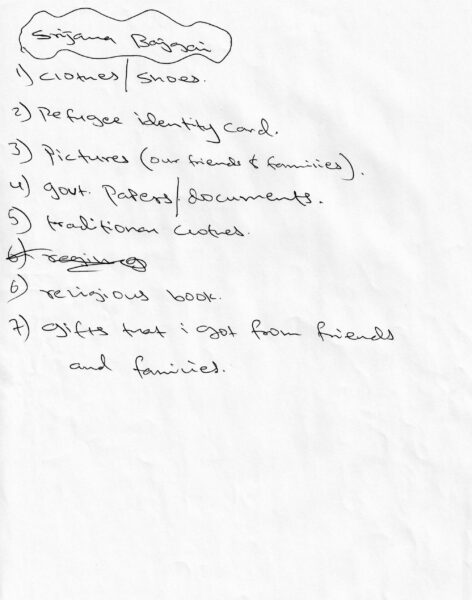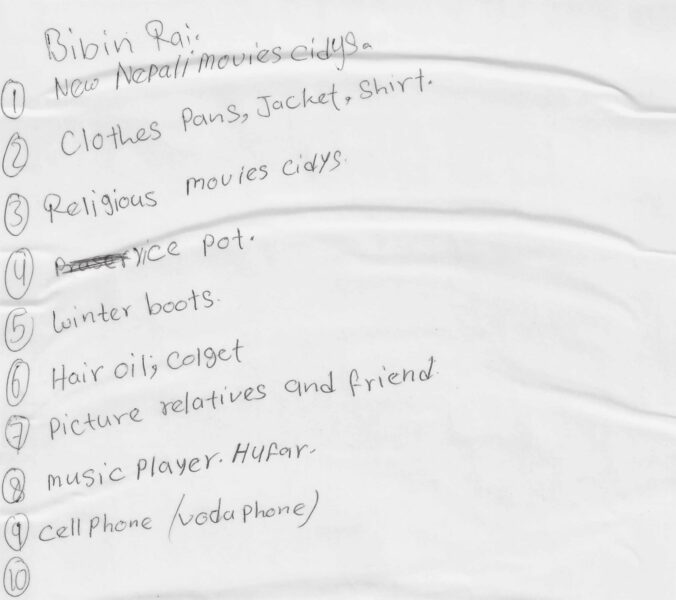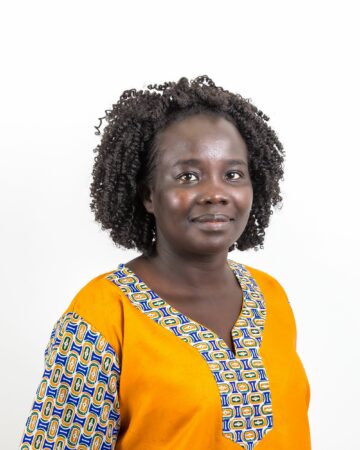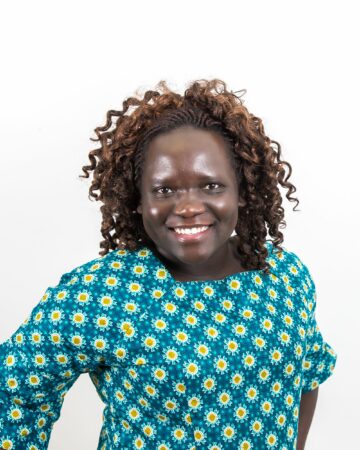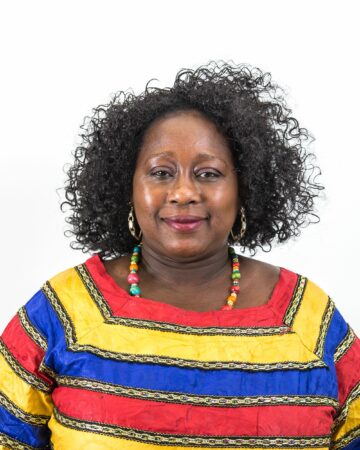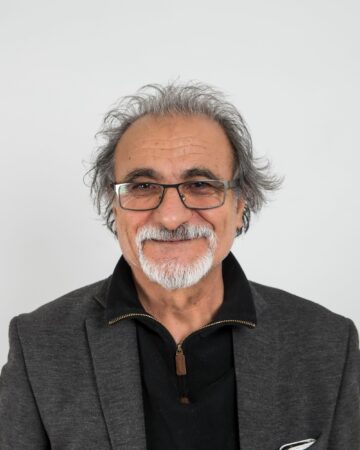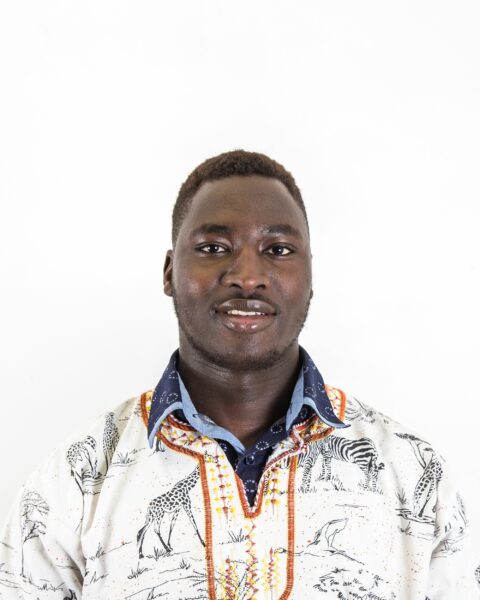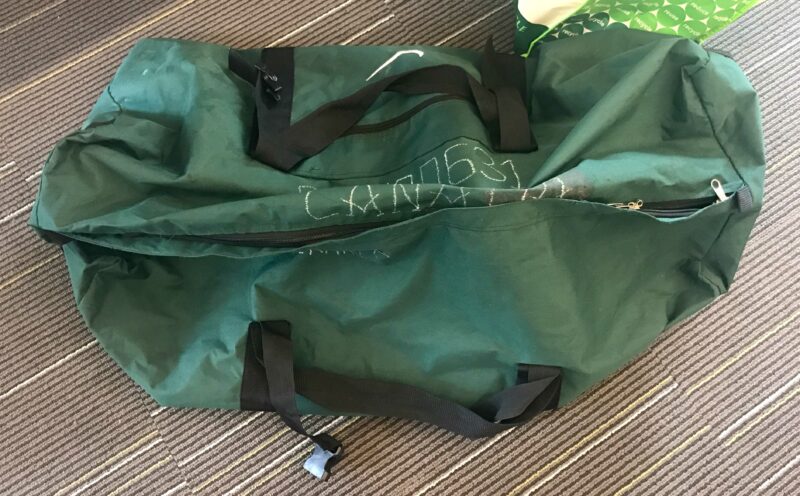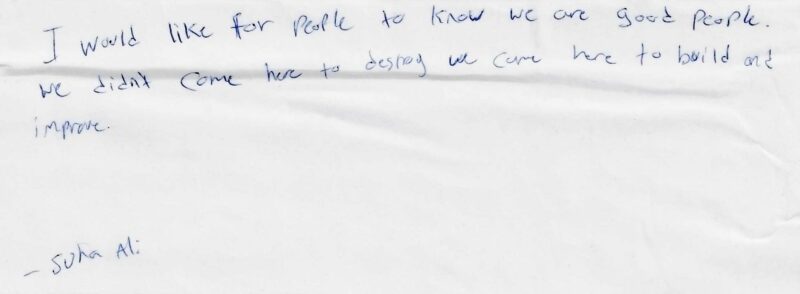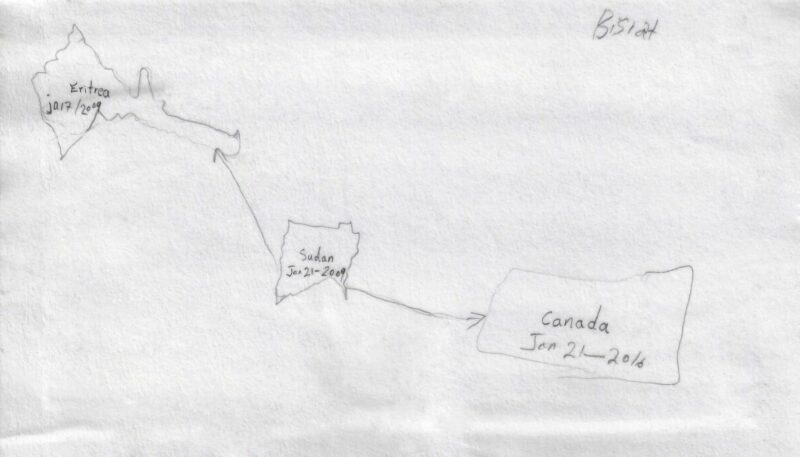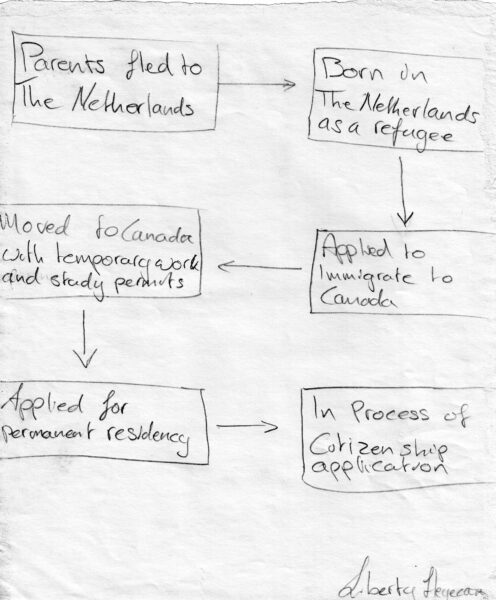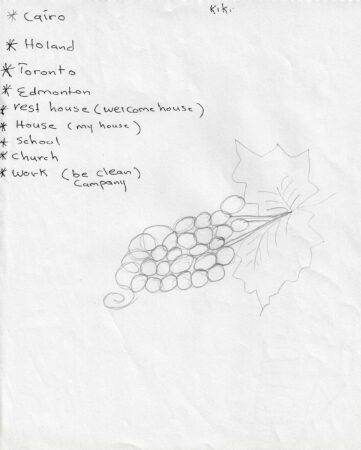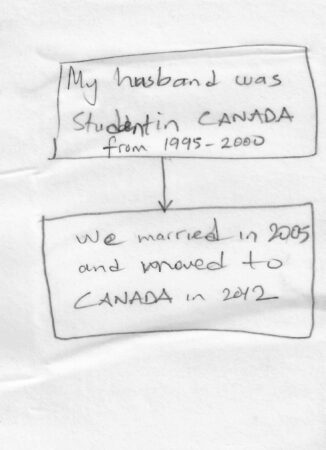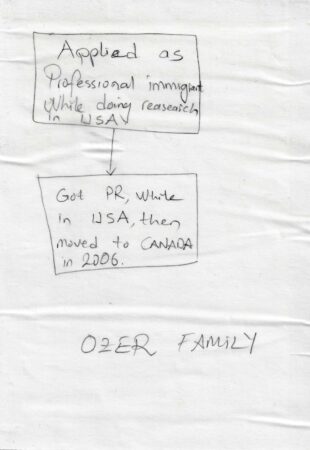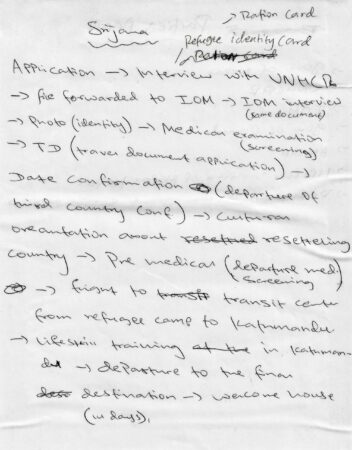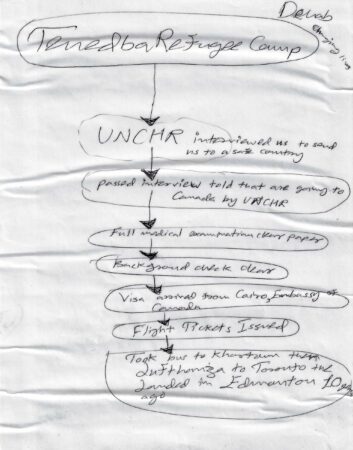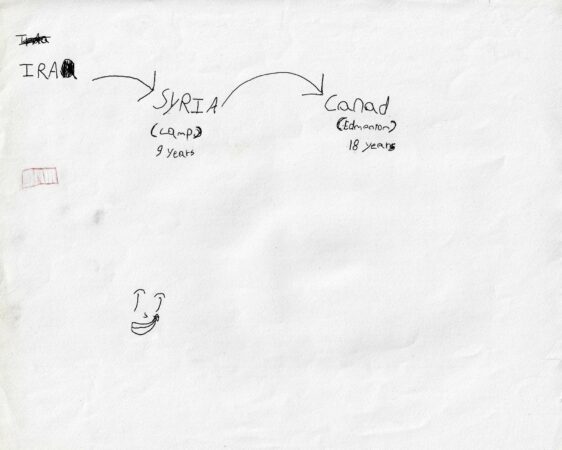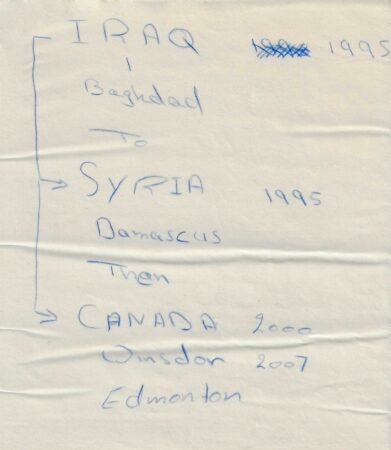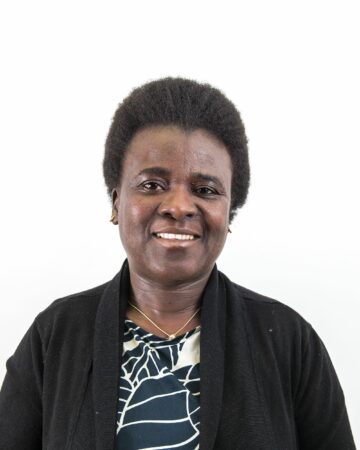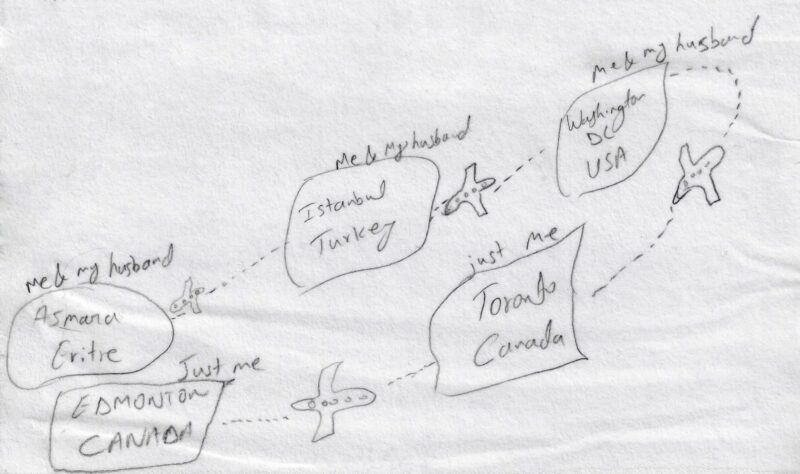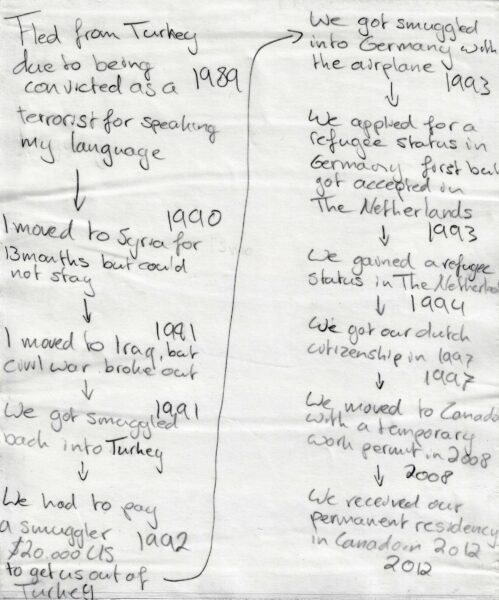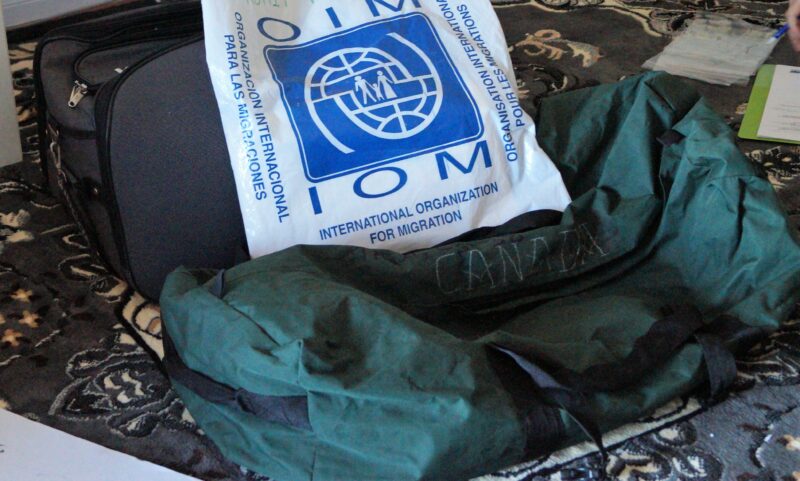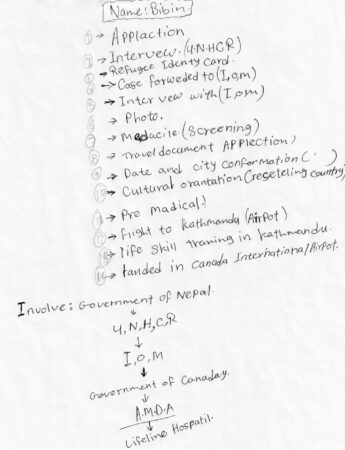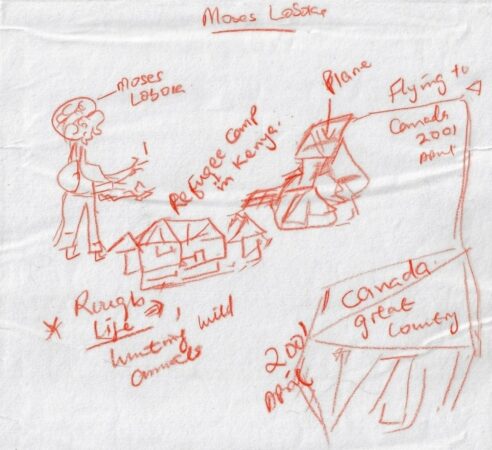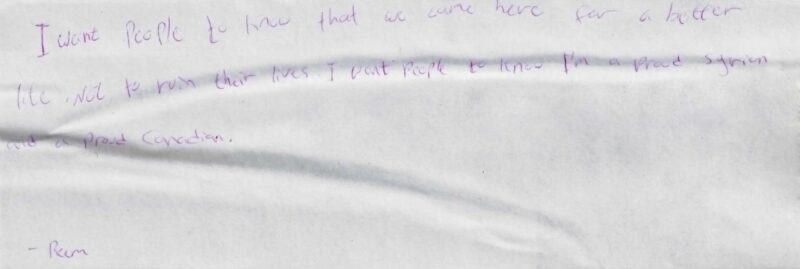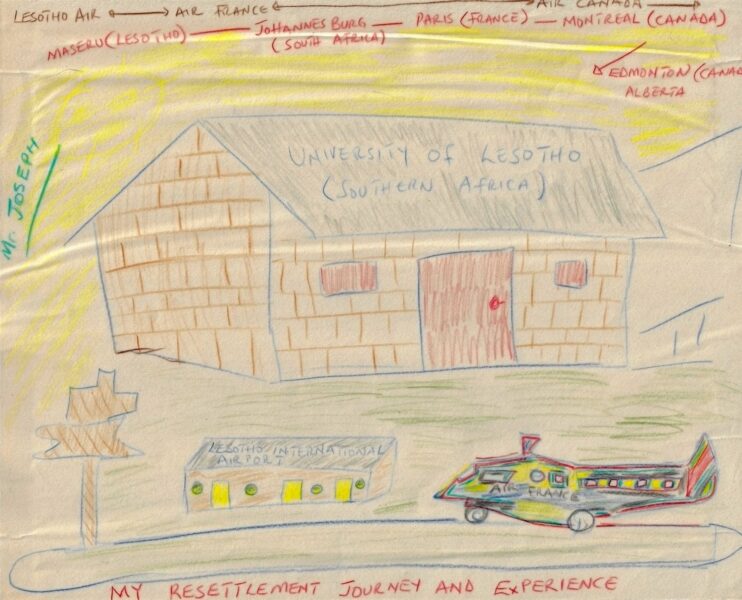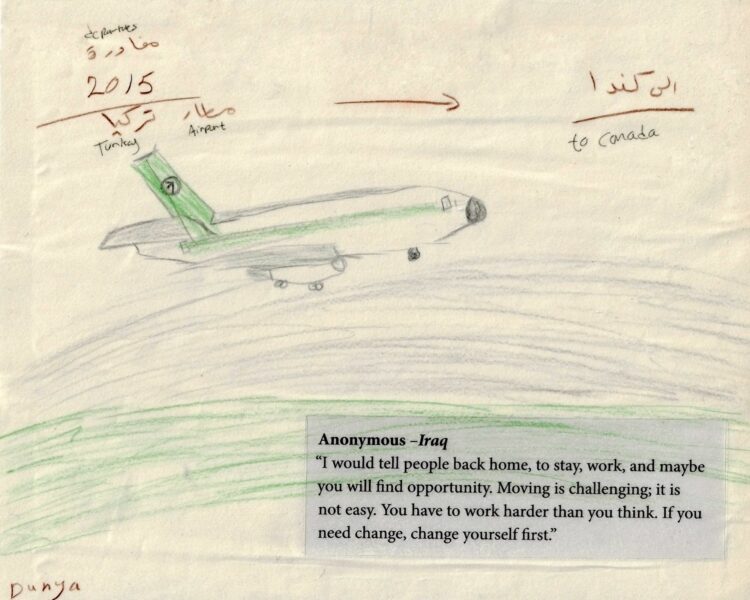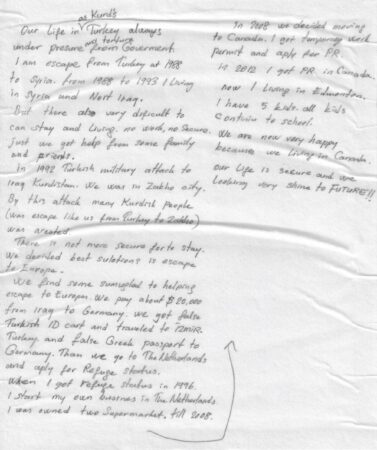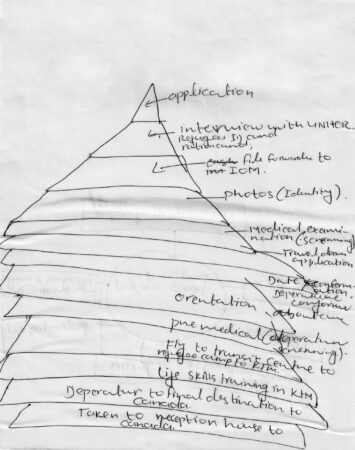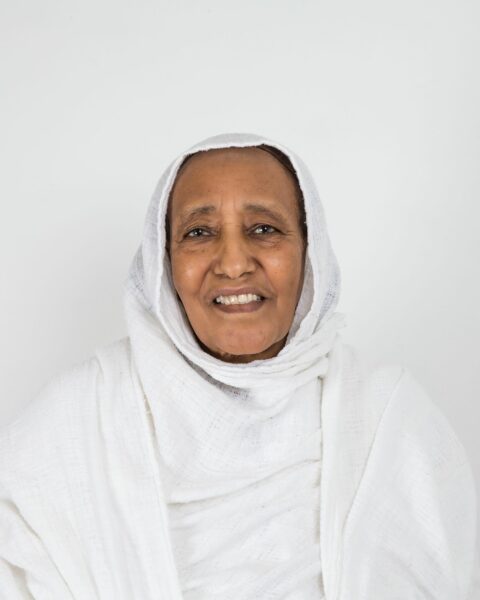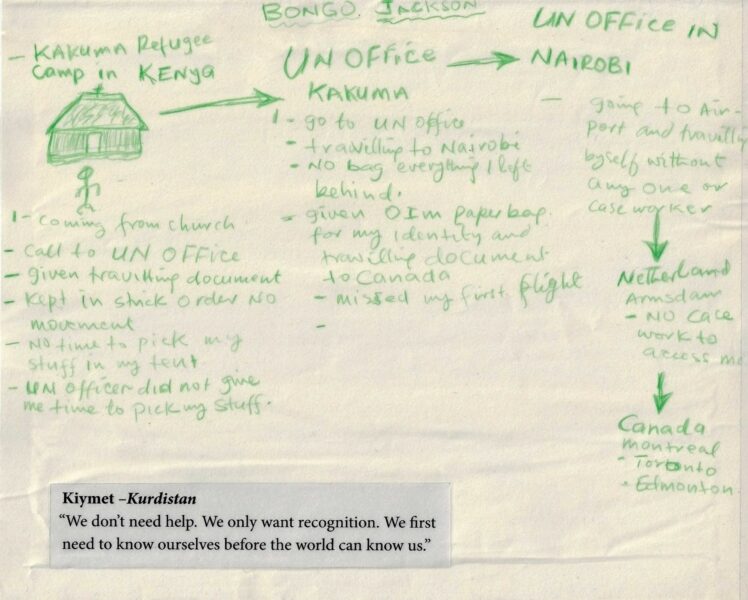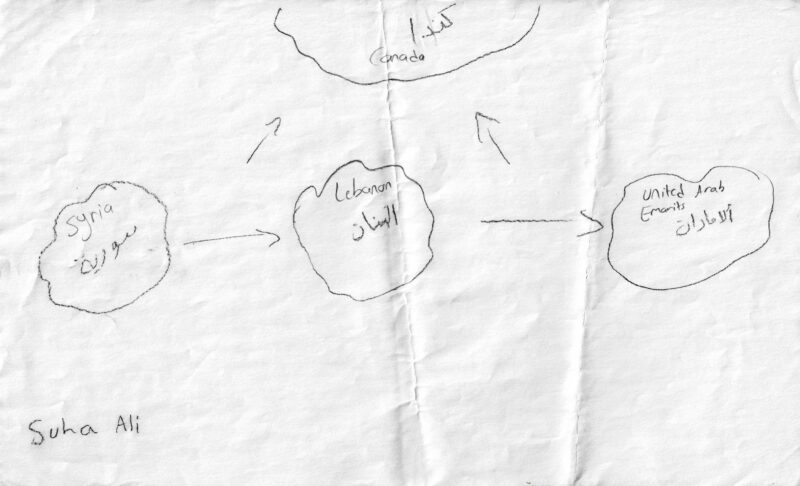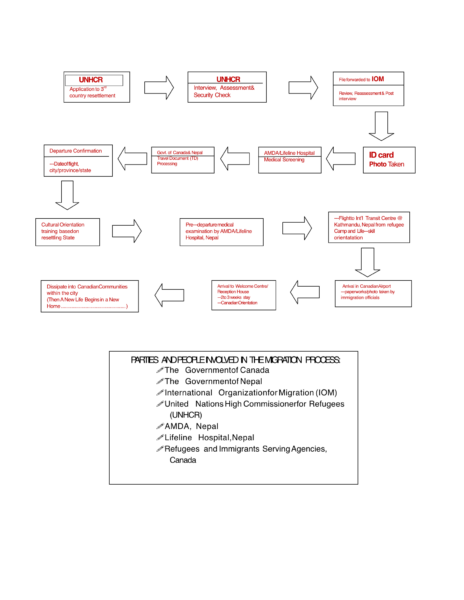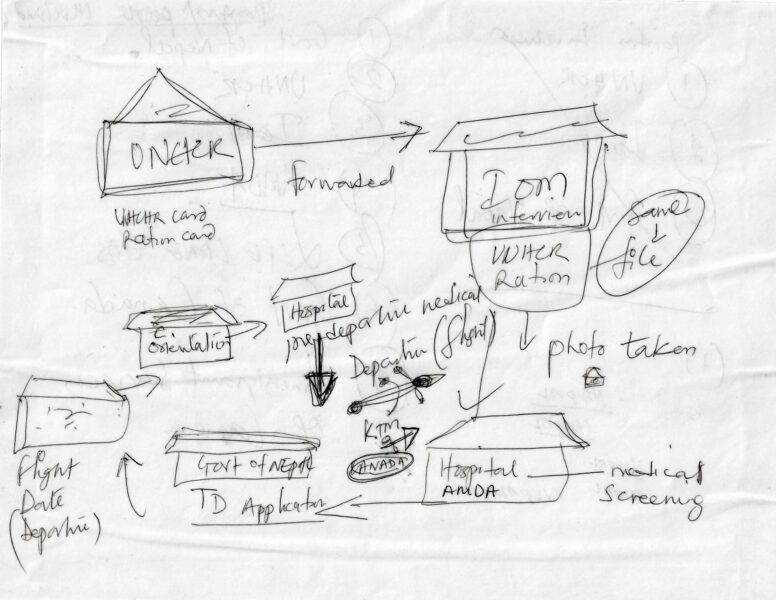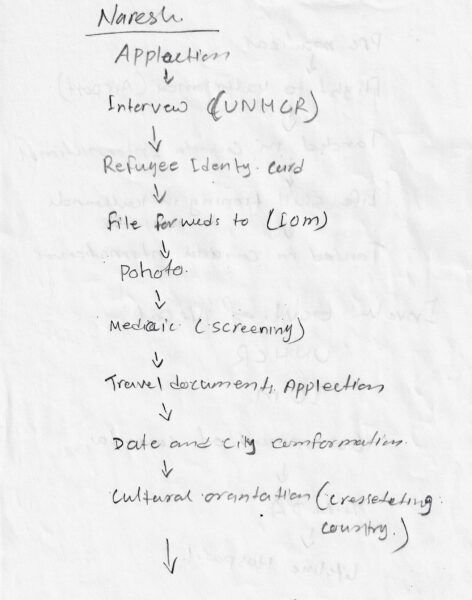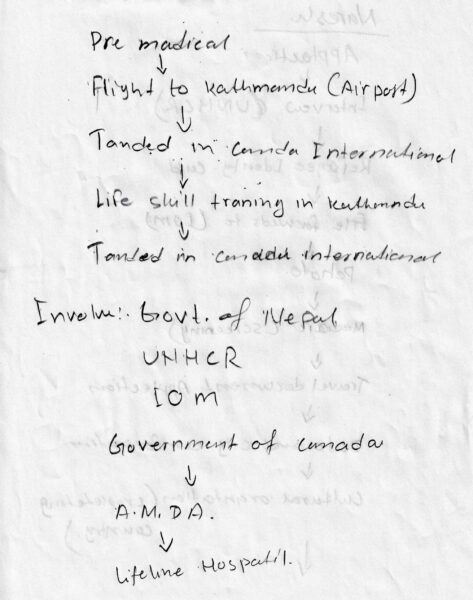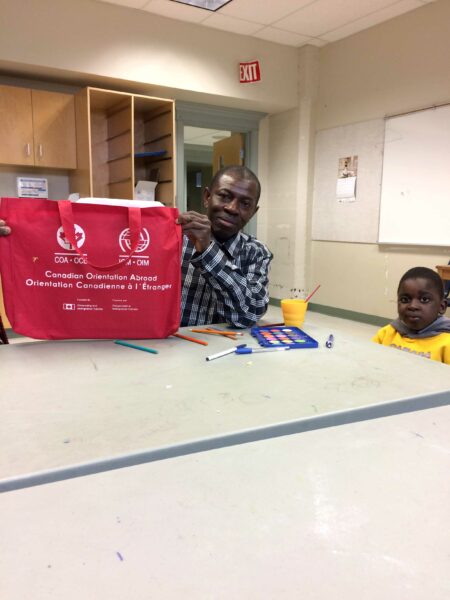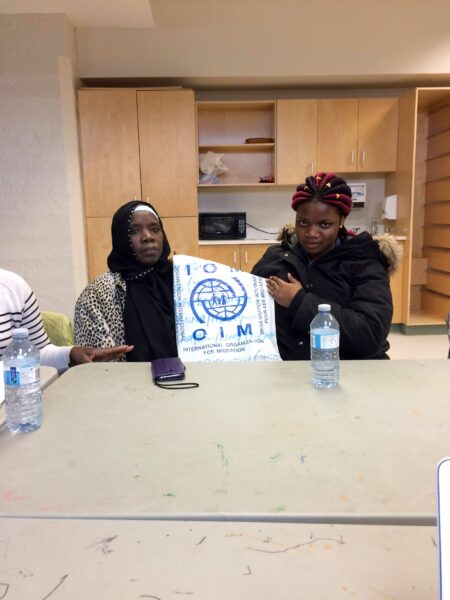Migration
Migration
الهجرة
Al Hijra
Move From Wan Country To Dea Other
کۆچ
बसाई सराई
ስደት
What stays with the old life? What comes with the new life?
Deciding on what to bring depends on why you are leaving, how long you have to plan, and/or whom you are saying goodbye to. Sometimes escaping with life alone, with an inner flame of hope, is enough to keep one going. Getting to Canada is not an easy process. There are a number of steps to follow, papers to file and people involved. Each story of arrival has its own wave of experiences and emotions.
Qu’est-ce qui reste avec l’ancienne vie? Qu’est-ce qui s’en vient avec la nouvelle vie?
Déterminer quoi apporter dépend des raisons à la source du départ, du délai de planification et des personnes que nous laissons derrière nous.
Parfois, s’enfuir en ne pensant qu’à la vie, avec une lueur d’espoir en dedans de soi, voilà une source de motivation suffisante pour continuer à foncer. Aller au Canada, ce n’est pas chose facile. Il y a plusieurs étapes à traverser. Il faut envoyer des documents et faire affaire avec bien des gens. Tous les arrivants vivent leur propre gamme d’expériences et d’émotions.
ما الذي يبقى مع الحياة القديمة؟ ماذا يأتي مع الحياة الجديدة؟
يعتمد اتخاذ القرار بشأن ما يجب إحضاره معك على سبب مغادرتك، والمدة التي يتعين عليك التخطيط لها،
و/أو من تودعه. أحيانًا يكون الهروب من الحياة بمفردك، مع شعلة الأمل الداخلية، كافيًا للاستمرار. الوصول إلى كندا ليس بالأمر السهل. هناك عدد من الخطوات التي يجب اتباعها، والأوراق التي يجب تقديمها، والأشخاص المعنيين. كل قصة وصول لها موجة خاصة بها من التجارب والعواطف.
Ma yubka ma al haya gedima wa ma yabti ma haya al jedida?
Yutamit takadit maiyujib ikidar ala sabab mugadaratak. La min ataukik alek atatit awu min mantakulukun fi bada al ayan lel horuf al haya be mufuradak ma sula al amala dakalia taltaki alistimar al merik al wosul ila Canada le isa amelia saba.
Watin dae with dea old life? Watin cam with dea new life?
For mak up you mind watin for bring depend on wai you dae comot wusai you dae, ow long you get for plan en ready, en wudat you dae say goodbye to. Some tem wae you dae runaway for you life with dea hope say tin go fin for you, good for mak you glady dea say tin go fine for you. For cam nar Canada norto easy tin ooh. Boku tin dae for do, for do dea paper wok en dea pipul dem wae you get for wok with. All man get e yone experience en how den dea feel.
چی ماوەتەوە لە ژیانی کۆن؟ چی هاتووە لەگەل ژیانی نوێ؟
بڕیار دان لەسەر ئەوەی چی بهێنیت پەیوەندی دارە بە هۆکاری کۆچ کردنت، وە کاتی بەرنامە دانانت و ئەو کەسانەی بەجیی دەهێلی، هەندێک جار تەنها لەگەل ژیان را دەکەیت.
لەگەڵ پشکۆیەک هیوا لەوانەیە بەس بێت بۆی بەرەو پێش برۆیت.
گەیشتن بە کەنەدا کەرێکی ئاسان نییە گەلێک خال دەبێت پەیرەو کەیت و گەلێک وەرەقە ئامەدە کەیت ، هەر چیرۆکێکی گەیشتن ناوازەیە و تایبەتە.
पुरानो जीवनसंग के रहन्छ? नयाँ जीवनसंग के आउँछ?
के ल्याउने भन्ने निर्णय के मा निर्भर गर्दछ भने तपाई किन देश छोड्दै हुनुहुन्छ, योजना बनाउन कति समय लाग्ला र तपाई क-कस्लाईअलविदा भन्नु हुदैछ । कहिले काहीं जीवनमा एक्लै भाग्दा आशाको भित्री ज्वालाले एउटा व्यक्तिलाई जिउन पर्याप्त साथ दिन्छ । क्यानडा आउने प्रक्रिया त्यति सजिलो छैन । त्यहाँ प्रक्रियाका धेरै चरणहरू छन्, थुप्रै कागजातहरू बुझाउनु पर्ने हुन्छ र धेरै व्यक्तिहरू संलग्न हुन्छन । आगमनको प्रत्येक कथाको आफ्नै अनुभव र भावनाहरूको लहर हुन्छ ।
ካብ ቲ ናይ ቀደም ህይወት እንታይ ተትርፍ? ምስቲ ሓድሽ ህይወት እንታይ ይመጽእ?
እንታይ ከተምጽእ ከም ዘለካ ምውሳን ኣብ ስለምንታይ ትስደድ ከም ዘለኻ፡ ንኽንደይ ግዜ ክትውጥን ከም ዘለካ፡ .ከምኡ’ውን/ወይ ንመን ትፋነዎ ከም ዘለኻ። ሓደ ሓደ ግዜ ንውልቅኻ ጥራይ፡ ውሽጣዊ ሃልሃልታ ናይ ተስፋ እኩል እዩ ብምባል ንስደት ምምራሕ ፡ ንሓደ ሰብ እኹል እዩ። ናብ ካናዳ ምብጻሕ ቀሊል መስርሕ ኣይኮነን። ክትክተሎም ዘለካ ብርክት ዝበሉ ስጉምትታት፡ ክትመልኦም ዘለካ ወረቓቕትን ኣብዚ ስራሕ ዝሳተፉ ሰባት ብ ርክት ዝበሉ እዮም ኣለዉ። ናይ ነፍሲ ወከፍ መጻእተኛ ናቱ ዝኾነ ናይ ታሪኽ ማዕበል ፣ ተመኩሮታትን ስምዒታትን ኣለዎ።
Migration
Migration
الهجرة
Al Hijra
Move From Wan Country To Dea Other
کۆچ
बसाई सराई
ስደት
- What would come with you if you ran for your life and never returned?
- We all come with assumptions.
- What assumptions are made about you?
- Si vous deviez vous enfuir d’un lieu et ne jamais y revenir, qu’apporteriez-vous avec vous?
- Nous arrivons tous avec des suppositions.
- Quelles suppositions sont faites à votre sujet?
- ما الذي سيأتي معك إذا هربت للنجاة بحياتك ولم تعد أبدًا؟
- نحن جميعا نأتي مع الافتراضات.
ما هي الافتراضات عنك؟
- Madha sayaduth maek iidha harabt lilinajat bihayatik walam taeud abdan?
- Kuluna nati biaftiradati. Ma hi aliaiftiradat alati tanawalatha eanka?
- Watin, you go Kerr wit you if you runaway for you life en you nor ever go back nar you country?
- Watin nar de bad tin dem wae den kin tok about you?
- چ شتێک لە گەڵ خۆت دەهێنی کاتێ بۆ یەکجاری کۆچ دەکەی تا ژیانت ڕزگار بکەی ؟
- ئێمە هەموو ژیانمان بریایە ؟ چ بریایەک پەیوەستە بە ژیانی تۆ ؟
- यदि तपाई आफ्नो जीवनको लागि दौडिनुभयो र कहिल्यै फर्केर आउनुभएन भने तपाईसँग के आउँछ?
- हामी सबै अनुमानहरू लिएर आउँछौ ।
- तपाईको बारेमा के अनुमान गरिएको छ?
- ካብ ህይወትካ ሃዲምካ እንተ ዘይትምለስ እንታይ ምረኸብካ ?
- ኩላትና ግምታትና ሒዝና ኢና ንመጽእ። ብዛዕባኻ እንታይ ግምታት ዝተገብረ ይመስለካ፧?
